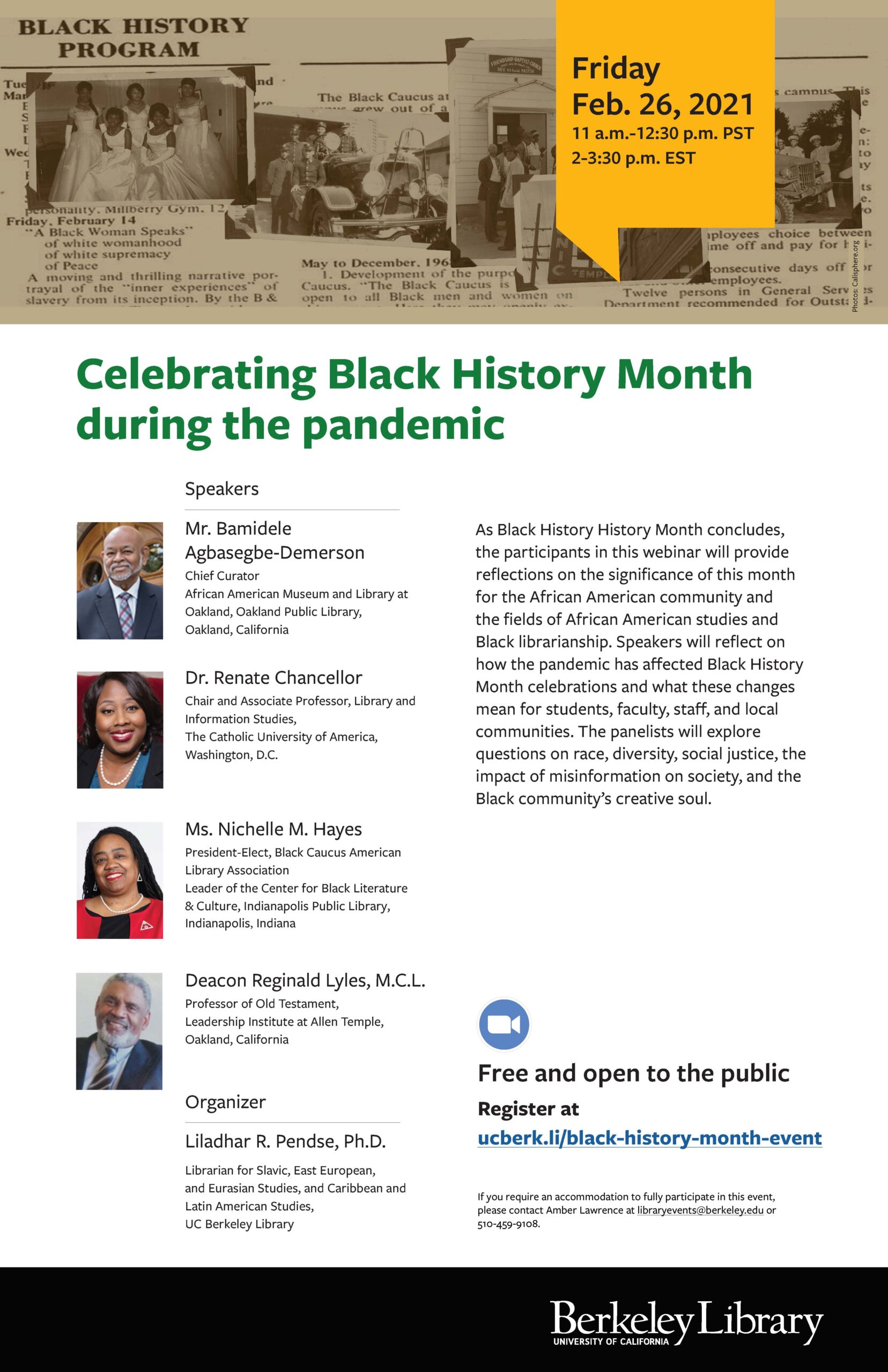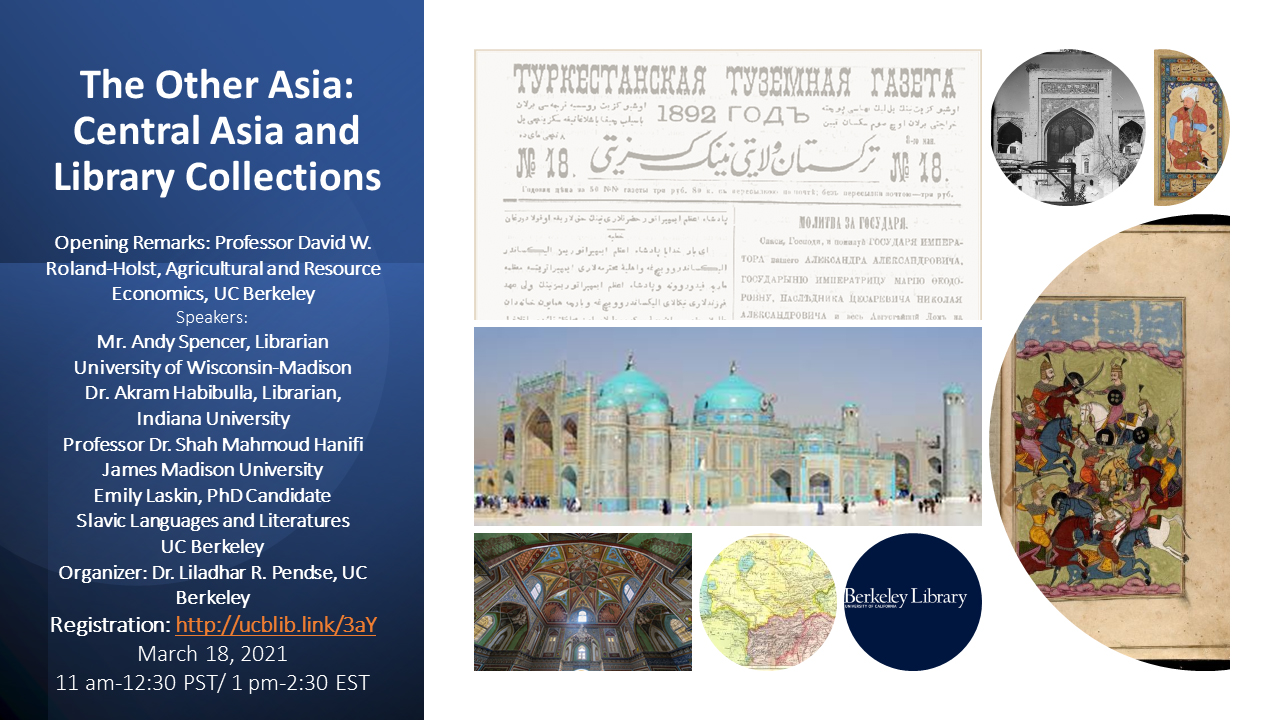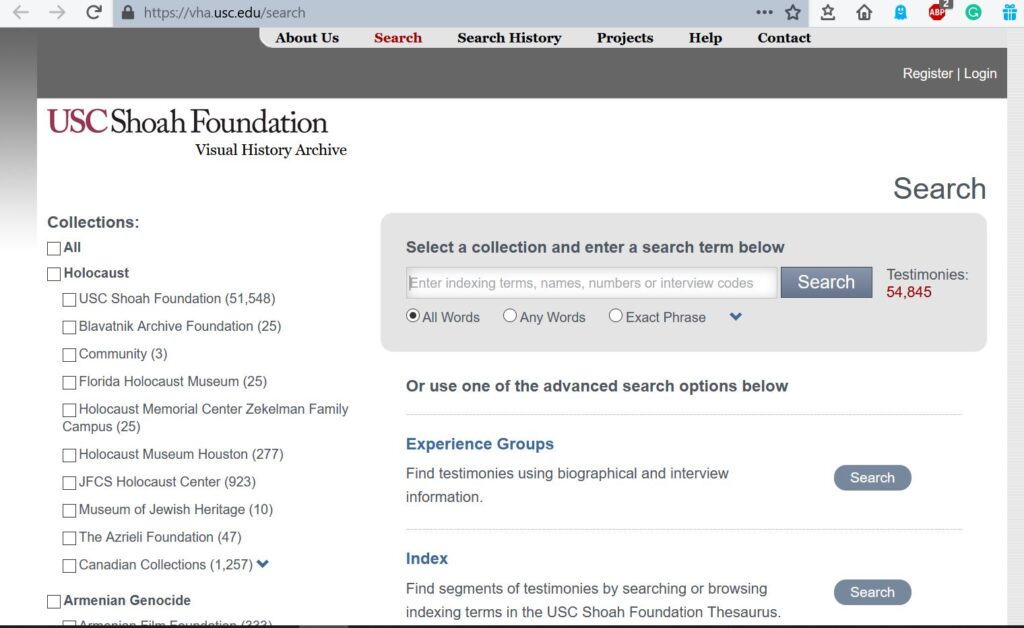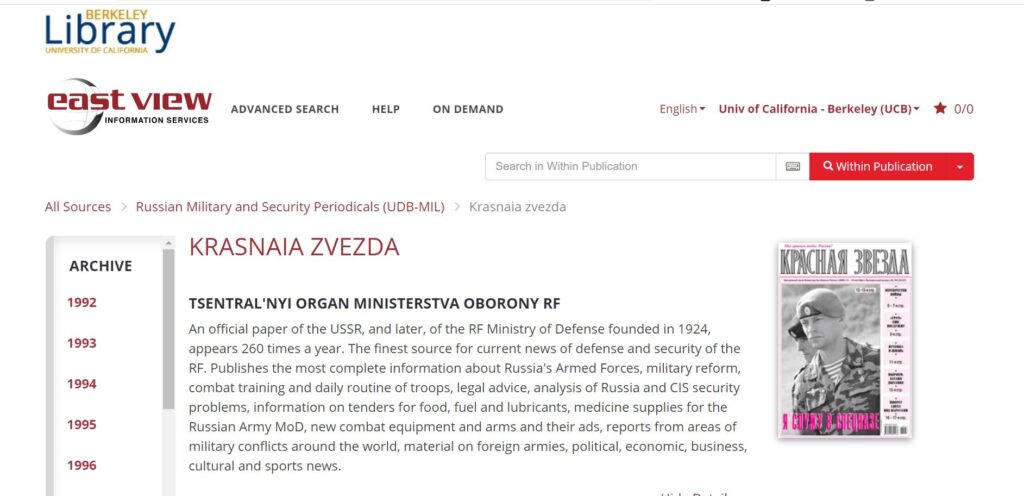Slavic, East European, and Eurasian Studies
Announcing a launch of new quarterly webinar series!-Save the Date, March 18, 2021
This event is the first quarterly event in a four-part series entitled “Connecting and collecting to empower.” The series will focus on libraries and library collections from different regions of the globe to highlight the collections, print, and electronic resources from often “forgotten” or “exoticized” parts of our world. No library is an island and as curators, we are often interconnected. It is a known fact that today academic libraries can no longer serve as an archive of all that was printed from a specific region. This series is geared towards students, faculty, and researchers, and the presenters in these webinars will be faculty, academic librarians, curators, researchers, and doctoral students. Each presenter will present how the library’s collections have aided them in their academic pursuits. What were some of the challenges they had to face when they were looking for specific resources and how and if the librarians helped them overcome them?
First Webinar: The Other Asia: Central Asia and Library Collections (Spring 2021)
This 90 minutes webinar is dedicated to various library sources in Central Asia. Often, just like the Great Game in the 19th century, Central Asian Studies library collections are contested and relegated between the North American librarians for East European/ Eurasian Studies and Middle Eastern/ Near Eastern Studies. The US State Department, on the other hand, has attributed Central Asia alongside South Asia. Thus collecting Central Asian materials marks extensive collaboration among various librarians. The speakers at this webinar will speak to their efforts in collaborating to build a sustainable collection at their institutions. In this meeting, they will discuss some of the strategies they have used to develop research-level collections and collaborate with their colleagues in Central Asia. They will also focus on some open access resources.
This zoom event is free and open to all with prior registration here.
Thursday, March 18, 202111 am-12:30 PST/ 1 pm-2:30 EST
Opening Remarks: Professor David W. Roland-Holst, Agricultural and Resource Economics, UC Berkeley
Speakers:
Mr. Andy Spencer, Librarian, Middle Eastern & Central Asian Studies Librarian, University of Wisconsin-Madison
Dr. Akram Habibulla, Librarian for Middle Eastern, Islamic, and Central Eurasian Studies, Indiana University
Dr. Shah Mahmoud Hanifi, Professor of History and the founding coordinator of the Middle Eastern Communities and Migrations minor, James Madison University
Emily Laskin, Ph.D. Candidate Slavic Languages and Literatures, UC Berkeley
Organizer: Dr. Liladhar R. Pendse, UC Berkeley
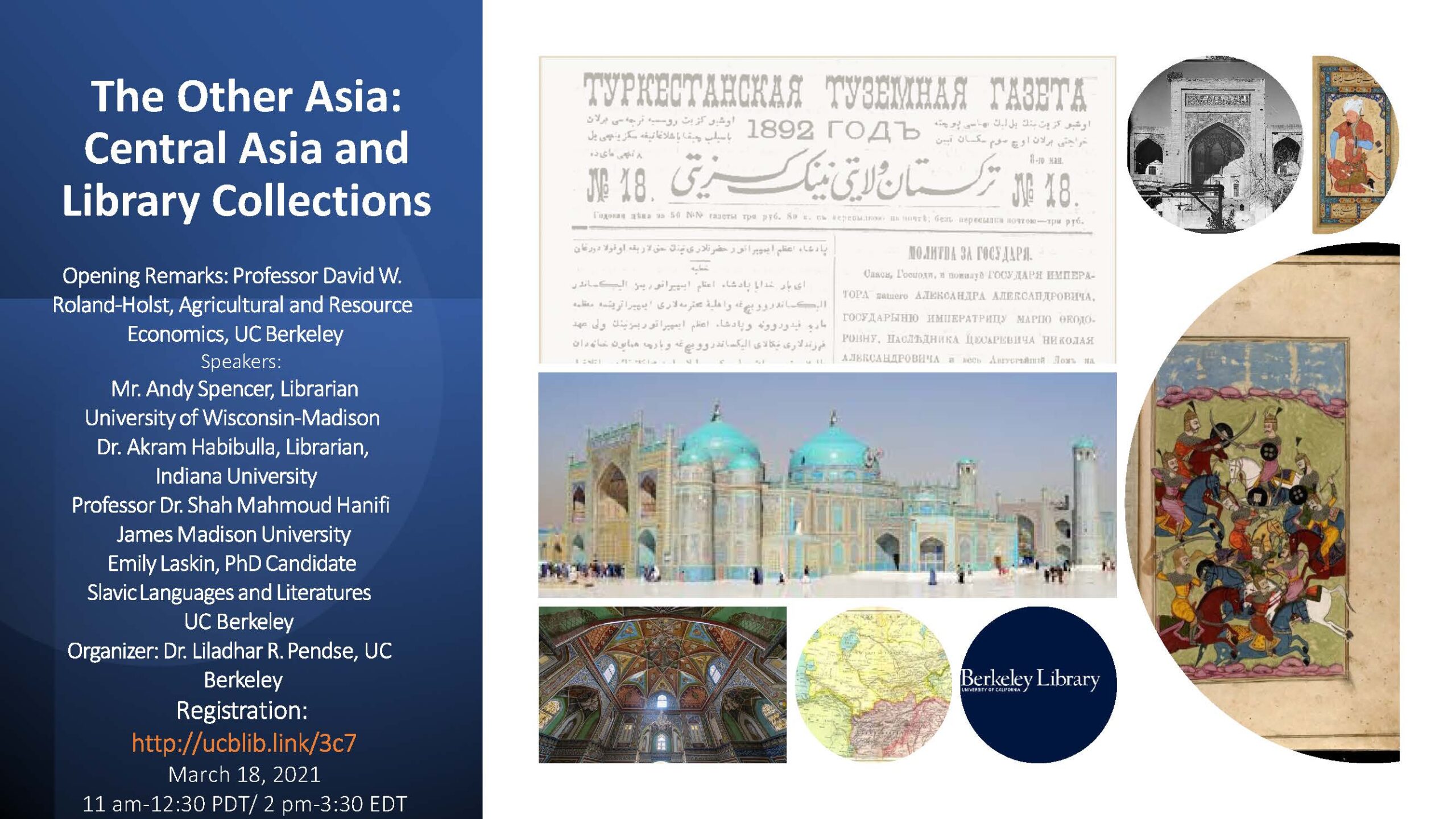
Happy International Women’s Day-March 8th!
Today, March 8, is celebrated around the world as International Women’s Day. In the USSR, this holiday was celebrated rather religiously as the role of Soviet women in the success of the Soviet experiment and internationalist policies was undeniable. The conceptualization of the Soviet Woman as an idea was nuanced and complicated. A Wikipedia entry starts as follows, “International Women’s Day (IWD) is a global holiday celebrated annually on March 8 to commemorate the cultural, political, and socioeconomic achievements of women.[3] It is also a focal point in the women’s rights movement, bringing attention to issues such as gender equality, reproductive rights, and violence against women.”[4]
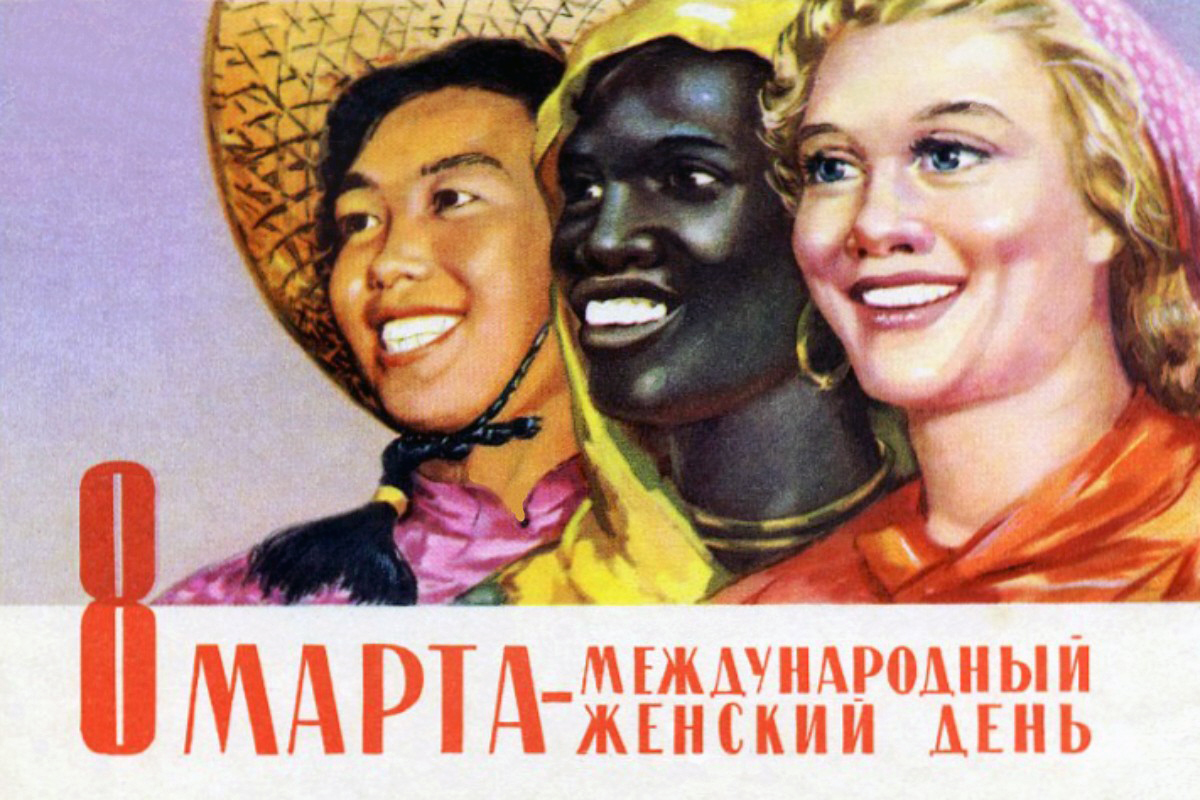 Image Source: Messy Nessy (https://www.messynessychic.com/2017/03/10/the-soviet-communist-origins-of-international-womens-day/) Fair Academic Use Only. The copyright belongs to the creator of the image.
Image Source: Messy Nessy (https://www.messynessychic.com/2017/03/10/the-soviet-communist-origins-of-international-womens-day/) Fair Academic Use Only. The copyright belongs to the creator of the image.
Temma Kaplan’s article, “On the Socialist Origins of International Women’s Day,” provides insights into how this day became a signifier in the Socialist World. One however forgets that the origins of this day can be found in Germany as noted by Rochelle Goldberg Ruthchild in her article, “From West to East International Women’s Day, the First Decade.” Here you can access some materials from UC Berkeley Library’s catalog regarding International Women’s Day. Also, some posters from the collections of several California libraries can be found here.
One can watch an interesting clip from YouTube with a title, “Демонстрация женщин в 1917 году. Московские Новости. 8 марта 1967,” and a concert honoring women in the Soviet Union from 1984.
Below is the clip of a 1963 concert dedicated to International Women’s day:Концерт 8 Марта из Большого театра СССР (1963).
And here is a clip of protest on the occasion of March 8th from Mexico.
Just launched: the Global Social Responses to COVID-19 Web Archive!
We are pleased to announce that the Global Social Responses to COVID-19 Web Archive has been launched. Created in March 2020 at the onset of the pandemic — and curated by 29 librarians throughout the Ivy Plus Libraries Confederation and beyond — the Archive documents regional, social responses to the pandemic, which are critical in understanding the scope of the pandemic’s humanitarian, socioeconomic, and cultural impact. With an emphasis on websites produced by underrepresented ethnicities and stateless groups, the Archive covers (but is not limited to): sites published by non-governmental organizations that focus on public health, humanitarian relief, and education; sites published by established and amateur artists in any realm of cultural production; sites published by local news sources; sites published by civil society actors and representatives; and relevant blogs and social media pages. At the time of its launch, the Archive featured over 2,000 websites from over 80 countries in over 50 languages.
You can access the collection in Archive-It here: https://archive-it.org/collections/14022.
For more information about the Global Social Responses to COVID-19 Web Archive (including a full list of curators), see: libguides.princeton.edu/covid-ivy.
For a blog post that may be redistributed across the Confederation and beyond, please see the following: https://ivpluslibraries.org/2021/03/iplc-launches-the-global-social-responses-to-covid-19-web-archive/.
The Ivy Plus Libraries Confederation’s Web Collecting Program is an initiative of the Confederation’s Collection Development Group, under the direction of the Web Collecting Advisory Committee and Samantha Abrams, the Web Resources Collection Librarian. If you have questions about the Global Social Responses to COVID-19 Web Archive (or if you’d like to get involved by proposing one of your own collections), please reach out to ivyplusweb@library.columbia.edu.
I hope you’ll join me in recognizing those (copied here) involved in making this important resource available to researchers and the general public: Fernando Acosta-Rodríguez, Ellen Ambrosone, Yuusuf Caruso, Paloma Celis Carbajal, Stuart Dawrs, Charlotte Giles, Glaudia Götze-Sam, Tristan Hinkel, Bogdan Horbal, Lunja Jeschke, Thomas Keenan, Ksenya Kiebuzinski, Miree Ku, Joshua Kueh, Hyoungbae Lee, Heather Martin, Brandon Miliate, Brendan Nieubuurt, Setsuko Noguchi, Liladhar Pendse, Anna Rakityanskaya, Deborah Schlein, Joshua Seufert, Alain St. Pierre, Sean Swanick, Amy Torres, Gudrun Wirtz, Ryan Wolfson-Ford, and Lou Zhou.
Source: Samantha Abrams, Columbia University Libraries. Posted by Liladhar Pendse- participant-curator in the archival project (UC Berkeley Library).
Save the date: Black History Month Celebration at UC Berkeley Library-A webinar
Dear All,
We have organized an upcoming event that will mark Black History Month at UC Berkeley on February 26, 11-12:30 pm PST/ 2 pm to 3:30 pm EST. I wanted to thank our speakers for this event, and colleagues in the Racial Justice Taskforce, Library Communications Team: Aisha, Amber, Tor, and Tiffany, who have supported me with organizing this event. The event is free and open to all. Please see the event poster (Thank you, Aisha-actual poster creation, and Tor-with edits).
The registration link is below:
Graduate Student Conference: “Images of the Future in the History of Russian Culture”
Graduate Student Conference
“Images of the Future in the History of Russian Culture”
Date: April 16-18, 2021
Deadline: March 25, 2021
Who can participate: MA students, Ph.D. students, independent scholars
Who organizes: Moscow School of Social and Economic Sciences
Topics: The future as an element of political ideology; projects and experiments in the field of urban planning policy, social relations, and everyday life; ideas about the future in different social groups; images of the future in art and visual culture; utopian worlds in literature and cinema; religious and quasi-religious eschatology.
Format: Zoom platform
More information:
http://msses.vectors.tilda.ws/future2
NYU Jordan Center’s 2021 Graduate Student Essay Competition (FY)
See the announcement below:
“The Jordan Center for the Advanced Study of Russia and All the Russias are pleased to announce the second annual Graduate Student Essay Competition. Enter for a chance to get published on the blog and win cash prizes! We invite 750-1200 word submissions from full- or part-time M.A. and Ph.D. students from any accredited academic institution in the United States, on any topic and sub-discipline within Russian, East European, and Eurasian Studies, broadly defined. Cultural criticism; public-facing treatments of scholarly work; political analysis; book, film, or event reviews; and more are welcome.
All submissions must be in English and observe the blog’s submission guidelines and full competition rules.
Essays are due no later than April 15th at 11:59 PM EST and must be submitted via this Google form.
Seven (7) winners will be selected based on their pieces’ originality, clarity, and argumentation, as well as their correspondence to the blog’s general tone and interests as stipulated in the submission guidelines linked above. Winners will receive, respectively, $500 (first prize); $250 (second prize); $100 (third prize); and $50 (runners-up). Winners and runners-up will have their essays published in All the Russias.
Competition results will be announced by Summer 2021.
Please direct any questions to alltherussias@gmail.com.”
Event Reminder: Undaunted Archivists and Curators from the American South Speak!
Undaunted Archivists and Curators from the American South Speak!
February 18, 2021-12:30-2 p.m PST
Please register for the event
Open to All with prior registration
Announcing a launch of new quarterly webinar series!-Save the Date, March 18, 2021
This event is the first quarterly event in a four-part series entitled “Connecting and collecting to empower.” The series will focus on libraries and library collections from different regions of the globe to highlight the collections, print, and electronic resources from often “forgotten” or “exoticized” parts of our world. No library is an island and as curators, we are often interconnected. It is a known fact that today academic libraries can no longer serve as an archive of all that was printed from a specific region. This series is geared towards students, faculty, and researchers, and the presenters in these webinars will be faculty, academic librarians, curators, researchers, and doctoral students. Each presenter will present how the library’s collections have aided them in their academic pursuits. What were some of the challenges they had to face when they were looking for specific resources and how and if the librarians helped them overcome them?
First Webinar: The Other Asia: Central Asia and Library Collections (Spring 2021)
This 90 minutes webinar is dedicated to various library sources in Central Asia. Often, just like the Great Game in the 19th century, Central Asian Studies library collections are contested and relegated between the North American librarians for East European/ Eurasian Studies and Middle Eastern/ Near Eastern Studies. The US State Department, on the other hand, has attributed Central Asia alongside South Asia. Thus collecting Central Asian materials marks extensive collaboration among various librarians. The speakers at this webinar will speak to their efforts in collaborating to build a sustainable collection at their institutions. In this meeting, they will discuss some of the strategies they have used to develop research-level collections and collaborate with their colleagues in Central Asia. They will also focus on some open access resources.
This zoom event is free and open to all with prior registration here.
Thursday, March 18, 202111 am-12:30 PST/ 1 pm-2:30 EST
International Holocaust Remembrance Day (January 27)
Today is International Holocaust Remembrance Day. On this day, while we reflect on the tragedy Shoah and its meaning, we also remember genocides that have occurred all over the world. The First Nations’, Armenians, and Rwandan genocides are some of the events that mark our humanity’s failure to prevent modern tragedies based on collective punishment mechanisms, state inflicted aggressions, and extremist ideologies. Below are some of the library resources that help us reflect upon these tragedies that could have been prevented only if the world could have countered these aggressions in a cohesively decisive way. The UN definition of genocide can be found here. Below are some sources in our library’s collections that will help you know more about Shoah and other genocides.
Holocaust, Jewish (1939-1945), in literature.
Holocaust, Jewish (1939-1945), in motion pictures.
Holocaust survivors — Psychology.
Holocaust survivors — Mental health.
Holocaust, Jewish (1939-1945) — Psychological aspects.
Armenian Genocide, 1915-1923.
Trial of the Russian Military and Security Periodicals (UDB-MIL) Database
We currently have set up a thirty-day trial of the Russian Military and Security Periodicals (UDB-MIL) Database created and hosted by East View Information Services. This database includes full-text access to the collection, including several dozen publications covering military and security developments in Russia from both official and independent sources. All branches of the armed forces are covered by this collection, including the Russian Air Force, Army, and Navy. In addition to journals and newspapers published in Moscow, UDB-MIL presents imprints from military districts and some armies and divisions. More importantly, the collection includes several vital English-language sources on the Soviet and now Russian militaries.
The database can be accessed using the link that is embedded here. Please use your UC Berkeley credentials to authenticate before accessing the database.
Below is a key Russian military newspaper landing page: Krasnaia Zvezda (the Red Star).

